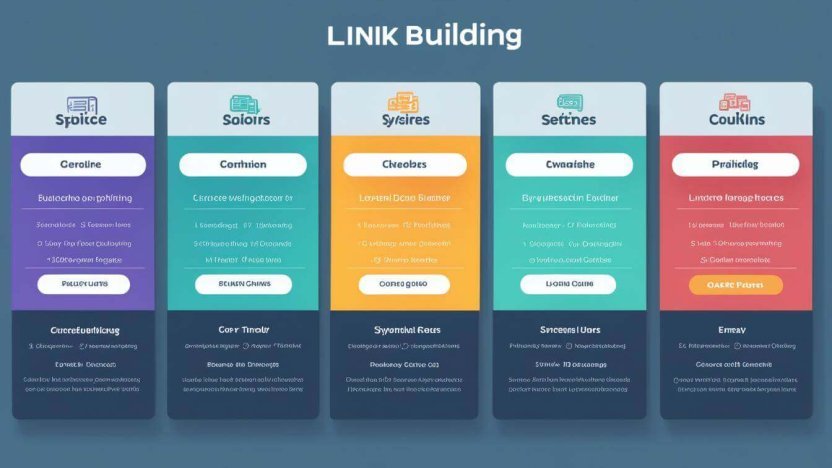Ever wonder how much it costs to make your website shine with link building? Want to know the different ways and what they cost? I’ll share my insights and experiences with you in this article.
First, let’s look at some eye-opening facts about link building:
1. Companies spend around 10-20% of their marketing budget on these packages. That’s a big chunk!
2. SEMrush found that sites with lots of quality backlinks rank better in search results.
3. A Moz survey showed that over 65% of marketers find link building the trickiest SEO tactic.
Now, with your interest sparked, let’s explore link building packages more. We’ll look at various methods and learn tips to understand this key SEO area better.
The Evolution of Link Building: Content Marketing vs Traditional Methods
In the world of link building, it’s vital to change with the times. New strategies often lead to better outcomes. While in the past, sending out lots of emails and using bulk outreach were common, things are different now.Content marketing stands out as a more powerful tool today.
Content marketing focuses on sharing expert content. This content attracts other content creators. By sharing your skills, you draw in links naturally. It’s about knowing your audience and creating content they find valuable.
On the other hand, traditional methods involve reaching out to others. This could be through influencer marketing or digital PR. Although these methods still work, they need more time and might not always work well.
Content marketing can help you stand out as an industry expert. By sharing valuable content, you build connections. These connections can lead to more link opportunities in the long run.
Creating content that goes viral can also boost your links. When people share your content on social media, it can lead to more backlinks. This helps more people find your brand.
So, what makes content marketing the better choice now? SEO and what search engines like Google look for has changed. They now prefer sites that offer meaningful content. By focusing on creating such content,
you meet search engines’ preferences for high-quality sites.
Here’s a look at how content marketing and traditional link building differ:
| Link Building Methods | Content Marketing | Traditional Methods |
|---|---|---|
| Approach | Focus on creating valuable content to attract natural links. | Proactively reach out to content creators or websites for link placement. |
| Benefits | Establishes your reputation as a thought leader and expert. Increases visibility and authority. | Can secure immediate links. Allows for more control over link placement. |
| Effort | Requires a deep understanding of your target audience and investment in creating high-quality content. | Involves proactive outreach, influencer marketing, and digital PR efforts. |
| Long-Term Results | Builds long-term relationships with content creators and generates organic link opportunities. | Might provide immediate links but lacks the potential for sustained growth. |
Clearly, content marketing is more beneficial than traditional methods. It not only gains you high-quality backlinks but also boosts your brand’s visibility. Adding content marketing to your strategy can lead to success in SEO’s ever-changing world.
Different Categories of Link Building Strategies
Link building involves many strategies, each falling into different categories. You can pick the best ones for your goals. It’s good to know what each type offers. Now, let’s look into these categories and the strategies they cover.
Earned Links
Earned links are treasured in the link building world. They come naturally, without asking for them. To get them, create content that’s worth sharing. This content should be engaging and valuable. It will draw others to link back to you, boosting your website’s credibility and visibility.
Outreach-Based Links
Outreach-based links take a proactive approach. You reach out to people or sites in your field. You offer them something valuable, like interesting content or a chance to collaborate. Building honest relationships and showing your value wins you strong backlinks. These backlinks enhance your website’s reputation.
Discovery Links
Discovery links come from others who find your content helpful during their research. To get more of these, keep producing top-notch content. This content should present new and insightful information. By doing this, your website becomes a go-to resource. You position yourself as an expert in your niche.
Passive PR
Passive PR uses platforms like HARO and Quora to share your expertise. When you answer questions or provide insights, you can get passive links. Others might link back to you or mention your site in their content. This method makes you more visible and respected in your field.
Submitted Links
Submitted links come from listing your site on relevant directories or forums. It’s a simple way to get your website seen. Not as powerful as other tactics, but it brings some traffic. Make sure to choose reputable places to list yourself. Also, share useful info about your site to draw interest.
Paid Links
Paid links involve buying links on other websites. They offer quick benefits, but can be risky. You might break search engine rules or harm your reputation. If you decide to buy links, do it carefully. Make sure the sites are trustworthy and match your niche well.
After learning about these strategies, you can now choose smart ones for your project. Keep in mind that combining strategies usually works best. This balanced approach can greatly improve your link building results.
The Mistakes to Avoid in Link Building
When I started link building, I focused too much on paid links. They turned out to be of poor quality. It’s better to learn and use other link building methods.
I also made the mistake of not narrowing down the areas I wanted to link from. It’s smarter to focus on a specific area. This way, your effort pays off more. Aim your content at a particular group for better backlinks.
One big lesson was that aiming just for more backlinks is not enough. You should aim to make friends with those who create content and offer something valuable to their audience. Networking and working together are key. By mingling with the right people and showing what you know, you build trust. This helps you get more links naturally and grow stronger online.
Common Link Building Mistakes Summary:
- Focusing solely on paid links
- Not selecting specific niches
- Forgetting to build relationships with content creators
Learning from these mistakes helps you make your link building plan better. Remember, it’s not just about getting lots of links, but getting the right ones. Think broadly. Focus on real relationships, great content, and the links that truly matter.
| Common Mistake | Impact | Solution |
|---|---|---|
| Focusing solely on paid links | Low-quality and ineffective links | Explore other impactful link building techniques |
| Not selecting specific niches | Inefficient link building efforts | Focus on a niche and build a reputation within that niche |
| Forgetting to build relationships with content creators | Lack of high-quality backlinks and collaborations | Engage with influencers and provide valuable content |

Understanding Link Quality and Google’s Perspective
Link building is key, and it’s vital to get how Google sees it. Google looks at the content and the reputation of websites and creators to judge links. The big search engine is big on E-A-T, or expertise, authoritativeness, and trust. This shows how important it is that content and creators are of high quality to make links valuable.
Google gives some tips on how to check a site’s quality. But, many experts look at data from tools like Ahrefs, Moz, and Semrush. These tools show us a lot about a site’s links, including their authority and where they come from.
To find and build good links faster, using SEO tools is a must. These tools help understand a site’s reputation better. They help spot the best places to get links from. It’s important to connect with sites and people that your audience trusts.
Why Link Quality Matters
Link quality impacts how well your site is seen and how traffic comes to it. Good links from trusted sites can boost your site in searches and draw in people. Bad links can hurt your site’s image and where it shows up in searches.
Google focuses on the quality of links and content. Their goal is to give users the best search results. So, focusing on getting good links helps you follow Google’s lead. This can improve where your site appears in search results.
Optimizing Link Building for Reputation and SEO Metrics
To build good links that help your site be trusted and found online, try these strategies:
- Make top-notch content. This draws people to link to your site. Share fresh ideas, useful tips, and interesting stories to get noticed and get links.
- Connect with top websites. Knowing and being known by experts can get you good links. Talk and share helpful info to show you know your stuff in your field.
- Track SEO data. Use tools to watch things like how strong sites are, if they link well to yours, and how various your link texts are. This info helps plan your link strategy smartly.
- Keep up with Google’s rules. Google always updates how it ranks sites. To stay on top, always learn from official news, reliable blogs, and forums. Be sure to keep your link ways up to date.
| SEO Metric | Definition | Importance for Link Quality |
|---|---|---|
| Domain Authority | A metric that predicts how well a website will rank on search engine results pages (SERPs) | High domain authority indicates a reputable website and can enhance the value of the link |
| Relevance of Linking Domains | The extent to which the linking domains are related to the content of your website | Links from relevant websites are considered more valuable and can boost your website’s reputation |
| Anchor Text Diversity | The variety of anchor texts used in the links pointing to your website | Diverse anchor text signals natural link acquisition and helps avoid over-optimization |
| Link Placement | The location of the link within the content of the linking page | Links placed in prominent positions, such as within the main body of the content, tend to have greater impact |
To sum up, knowing how Google sees link quality is a must for good linking. By valuing quality, using SEO tools, and following Google’s lead, your site can become more trusted and seen. Always keep quality at the forefront of your link efforts.
The Role of Link Building Strategy in SEO
A successful SEO campaign needs a good link building strategy. It aims to boost your website’s reputation and make it more visible in search results. To do this, use content marketing. This means making content that’s useful and makes people want to share it. This way, you earn links without even asking for them.
It’s key to put your company’s knowledge on websites that care about your topic. This helps you make friends with people who make content and talk to them. Then, they are more likely to link to you.
| Key Benefits of Content Marketing in Link Building Strategy |
|---|
| 1. Enhanced Website Reputation: A strong content marketing plan makes your website a place people trust for good info. This helps with getting links from other websites. |
| 2. Natural Link Acquisition: Make content that’s great and people want to share. This way, you get links without having to ask. These links can improve where you show up in search results. |
| 3. Targeted Exposure: Creating the right content for the right people helps you find readers who are likely to link back to you. This can help grow your links. |
Using content marketing can make your website a top source in your field. It makes your site show up more in searches. Plus, it helps build trust with your readers.
Good link building is more than just getting links. It’s about making helpful content and connecting with people who make content. This approach helps your site look good and bring in better search results over time.

Link Building Strategies for Different Skill Levels
Link building isn’t the same for everyone. Tailored strategies are key for your success, no matter your skill level. We will look at strategies for beginners, intermediates, and advanced link builders. Let’s dive into what works best for each skill set.
Beginner Level
Just starting out on your link building journey? No problem! There are easy strategies to help you start strong. Here are some tips for beginners:
- Utilize alumni lists: Reach out to your alma mater to list you as a successful alumni. It’s good for credibility and gives your site a backlink.
- Engage in blog commenting: Find blogs in your area and make thoughtful comments. Make sure to include your website link.
- Embrace email outreach: Connect with website owners or bloggers. Be nice, add value, and offer your content to them as a resource.
Intermediate Level
Have some link building experience under your belt? It’s time for harder, yet more rewarding tactics. Advance with these strategies:
- Guest blogging: Look for top sites in your niche that let you post. Offer unique, helpful content that fits their audience.
- Create crowdsourced posts: Work with other experts to make detailed, fact-based content. It builds links from those who contribute.
- Offer discounts or promotions: Contact websites or bloggers in your field with special offers for their readers. It can get more links to your site.
Advanced Level
Ready to take your link building game to the elite level? Here are some challenging yet rewarding strategies:
- Create shoulder niche content: Make content for related industries, drawing in their readers. You could get links from new, unexpected places.
- Utilize crowdfunding: Start a campaign linked to your industry. It could get your site covered by the media, gaining you powerful links.
- Fix grammar and spelling mistakes: Offer to fix content errors for free. You can get relevant backlinks while helping sites improve.
Choosing the right strategy for your level and goals is vital. Always be ready to try new things and change your plan as you learn. Time to apply these strategies and see your link profile grow!
| Skill Level | Recommended Strategies |
|---|---|
| Beginner Level | Utilize alumni lists, engage in blog commenting, embrace email outreach |
| Intermediate Level | Guest blogging, create crowdsourced posts, offer discounts or promotions |
| Advanced Level | Create shoulder niche content, utilize crowdfunding, fix grammar and spelling mistakes |
Conclusion
Finding the right link building packages prices can seem hard. But don’t worry, I’ve learned enough to help you through it. With the right strategy, you’ll be a pro at getting good links for your site.
Start by making valuable content for people to enjoy. When your content is unique and helpful, you’ll catch the eye of others. They’ll want to share your content, giving you those important links.
Also, making friends in your field can really help. Work with influential people, share projects, and offer something to their followers. These real relationships can bring you lots of helpful links. This will make your site more popular and respected.
Always pick link quality over quantity. Good links matter more than many bad ones. Stay away from just buying links. Instead, aim for links that come naturally. These show you’re trustworthy, both to search engines and people.
Link building isn’t quick or easy. It’s a process that keeps going. You need to keep learning and changing. With the right knowledge, your site can become more known and rank better in searches.
FAQ
What is link building?
Link building is about getting links from other sites. This helps your site show up better in search results.
What are the different types of link building strategies?
There are many ways to get links. These include earning them, finding them, asking for them, or even paying for them.
What are some common mistakes to avoid in link building?
Avoiding some mistakes is key. Don’t rely only on paid links. It’s also important to pick the right topics and to make friends with content creators.
How does Google define link quality?
Link quality for Google includes being an expert, being trustworthy and authoritative. The quality of your content and the reputation of the sites you link to matters too.
What is the role of link building strategy in SEO?
Link building is important for SEO success. It helps your site look better to search engines. Plus, it drives more natural traffic to your site.
What link building strategies are suitable for different skill levels?
Beginners can try simple things like commenting on blogs. Intermediate users might write for other blogs or offer discounts. For experts, there’s creating unique content, starting a crowdfunding campaign, or even fixing others’ writing errors.




